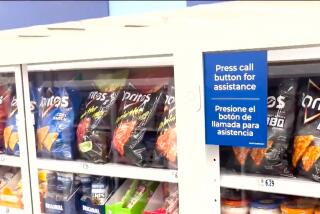Insurers limit consumersâ choices for getting prescribed drugs
Hereâs looking at you, Medco.
Jerry Lacy played Humphrey Bogart in the 1972 film âPlay It Again, Sam.â He also appeared in various soap operas. These days, though, heâs playing a bit part in the disaster movie known as the U.S. healthcare system.
Lacy, 76, of Calabasas, requires prescription meds to control his cholesterol and blood pressure. His wife takes pills for a thyroid condition.
But now Lacy has a choice to make: Pay full price for the meds at drugstores like CVS or Walgreens, or buy from a single source â the online drugstore belonging to Medco.
Thatâs the company his actors union uses to manage its prescription-drug benefit, which, until now, Lacy has preferred to stay with rather than switch to a more cumbersome Medicare Part D plan available to people his age.
âItâs like extortion,â he said of Medcoâs take-it-or-leave-it approach. âYou do it their way or they wonât pay.â
Just a few years ago, so-called pharmacy benefit managers, or PBMs, like Medco would contract with most leading drugstore chains so people could fill their prescriptions almost anywhere they pleased.
Then the PBMs realized they could operate more efficiently (and profitably) by limiting peopleâs choices to a single drugstore â their own. So they laid down the law with consumers.
In Lacyâs case, he received a letter from Medco recently informing him that heâs allowed to buy his meds just twice at a retail pharmacy before higher prices kick in.
âYou will pay the entire cost of those prescriptions if you continue to fill those long-term prescriptions at a retail pharmacy,â the letter declares in big block letters.
On the other hand, Lacy was told, he can fill his prescriptions at Medcoâs online drugstore at insured prices, âand your prescriptions will be sent right to you, with free shipping for standard delivery.â
Hmm. Tough choice.
But is it fair for consumers to be limited as to where they can shop, especially if their choice consists of just one alternative, and that one alternative just happens to be owned by the same company managing the insurance plan?
Moreover, are people really well served by missing out on the personal interaction with their regular pharmacist, who can answer questions while filling a prescription?
âWeâve been with the same pharmacist for 30 years,â Lacy said. âNow Medco is saying we canât buy from him any longer. If theyâre saying that to others as well, itâs going to put this guy out of business.â
PBMs serve as middlemen between insurers or employers and drug companies. They use their purchasing power to try to drive down drug prices and thus save their clients (that is, insurers and employers) money.
Although there are a number of PBMs operating, the market is dominated by just three firms â Express Scripts Holding, which recently acquired Medco for $29 billion; CVS Caremark; and OptumRX, a subsidiary of insurance giant UnitedHealthcare Group.
Together, these three companies represent about three-quarters of all prescriptions filled by PBMs. The merged Express Scripts/Medco accounts for about 40% of the market.
That market became even smaller last month when a mid-size pharmacy benefit manager, SXC Health Solutions, announced the buyout of rival Catalyst Health Solutions for $4.4 billion.
Brian Henry, a spokesman for Express Scripts, said the company was acting in peopleâs best interest by encouraging them to buy meds online from the companyâs own drugstore.
âThe goal is to deliver medicine in the most cost-effective way,â he said. âThe most affordable way to receive many drugs is as a generic through the mail.â
Gerald Kominski, director of UCLAâs Center for Health Policy Research, said Express Scripts makes a fair point. He acknowledged that prices are often lower when people buy their meds from online pharmacies.
âThe pharmacies have bulk purchasing power and they can pass along their savings to consumers,â Kominski said.
The question, he observed, is whether the prices that an online pharmacy like Medco may charge are the lowest possible prices, or whether theyâre simply lower than what a brick-and-mortar drugstore would charge.
âWould a more competitive marketplace bring about even lower prices?â Kominski asked.
Thatâs something we may never get to find out as more people are herded to no-choice options if they want insurance to cover their prescription meds.
Kominski said this is what economists refer to as âconstrained choiceâ â a system that deliberately limits oneâs options. âSimply put, you try to make the best of the worst of circumstances,â he said.
Lacy and other Medco customers will have to do that. And perhaps, as Medco says, theyâll benefit from lower prices for their drugs.
But will any of us benefit from losing the ability to interact face to face with a pharmacist? Will we benefit if neighborhood pharmacies follow independent bookstores into economic oblivion?
And is anyone comfortable with the rapid consolidation of the PBM business, with only a handful of players controlling the vast majority of the market? Has similar consolidation among phone and cable companies worked in consumersâ best interest?
Those are the questions lawmakers and regulators should be asking before this latest iteration of our healthcare system becomes irreversible.
David Lazarusâ column runs Tuesdays and Fridays. He also can be seen daily on KTLA-TV Channel 5. Send your tips or feedback to [email protected].
More to Read
Inside the business of entertainment
The Wide Shot brings you news, analysis and insights on everything from streaming wars to production â and what it all means for the future.
You may occasionally receive promotional content from the Los Angeles Times.









